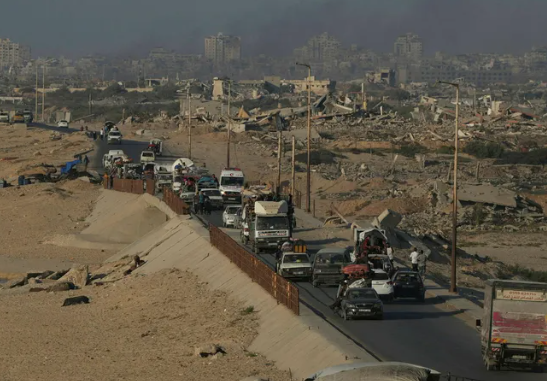
Displaced Palestinians fleeing northern Gaza Strip move with their belongings along the Sea Road, near Wadi Gaza, Saturday
A 38-page Trump administration document outlining the postwar reconstruction of the Gaza Strip envisions the relocation of all Palestinians from the enclave and the establishment of a U.S. tech hub, the Washington Post reported in an exposé.
According to The Post, Palestinians who own land will be offered a digital token in exchange for development rights. The token can either be used to finance life outside of the Gaza Strip or redeem an apartment in the Gaza Strip’s new « AI-powered, smart cities. »
The U.S. will retain full control over the enclave for at least a decade, slowly transferring enforcement duties to local police from what the document describes as « Western PMCs » – private military corporations.
The document also implies Saudi and Emirati involvement, naming infrastructure such as the MBS ring highway and tram and the MBZ highway. MBS is shorthand for Mohammed bin Salman, Saudi Arabia’s crown prince, while MBZ stands for UAE ruler Mohammed bin Zayed.
According to the document revealed by The Post, the depopulated and reconstructed Gaza Strip is designated as a hub for private industry, with the file naming companies such as Tesla and Amazon Web Services.
Called the Gaza Reconstitution, Economic Acceleration and Transformation Trust, or GREAT Trust, the proposal was developed by some of the same Israelis who created and set in motion the U.S.- and Israeli-backed Gaza Humanitarian Foundation (GHF) now distributing food inside the enclave. Financial planning was done by a team working at the time for the Boston Consulting Group.
U.S. President Donald Trump’s February vow to own and redevelop Gaza offered both a green light and a road map for the group of Israeli businessmen, led by entrepreneurs Michael Eisenberg, an Israeli American, and Liran Tancman, a former Israeli military intelligence officer.
They had already handed off the GHF project to implementers and moved on to the postwar problem in consultation with international financial and humanitarian experts, and potential government and private investors, as well as some Palestinians, according to people familiar with the planning.
